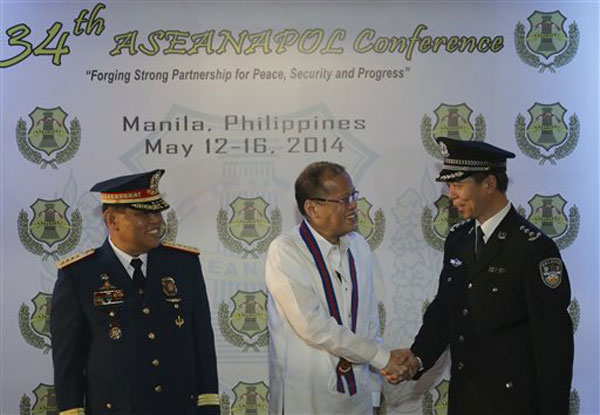Wildlife on Asean cops’ list

Philippine President Benigno Aquino III, center, welcomes Liao Jinrong, right, director of the International Cooperation Department of the Ministry of Public Security of China, as Philippine Police Chief Alan Purisima looks on during the 34th Association of South East Asian Nations Chiefs of Police (Aseanapol) conference in Pasay City on Tuesday, May 13, 2014. The police chiefs of the 10 member-countries of the Association of Southeast Asian Nations have agreed to strengthen cooperation against cross-border crime and make wildlife trafficking a major focus of their next conference. AP
MANILA, Philippines—The police chiefs of the 10 member-countries of the Association of Southeast Asian Nations (Asean) have agreed to strengthen cooperation against cross-border crime and make wildlife trafficking a major focus of their next conference.
Philippine National Police Director General Alan Purisima, said members of the Asean Association of Police Chiefs (Aseanapol) included crimes against wildlife on the agenda of the next Aseanapol meeting to be held in Indonesia in 2015.
“We are duty-bound to discuss regional cooperation regarding this matter since each country has (its own) laws regarding wildlife (protection),” Purisima said in a news briefing after the closing ceremony of the 34th Aseanapol conference in Pasay City on Thursday.
He said Aseanapol members signed a joint communique expressing support for improved regional cooperation in battling cross-border crimes, particularly terrorism, as proposed by the International Criminal Police Organization (Interpol).
“With this joint communique, we now have a more potent weapon against transnational crimes and terrorism,” he added.
Asked if the arrest of 11 Chinese fishermen on May 6 by Filipino maritime police near Hasa-hasa Shoal in the West Philippine Sea was discussed in the three-day event, Purisima said: “We do not deal with specific issues, but on a range of principles.”
The PNP chief said that Aseanapol did not tackle the territorial disputes involving member-countries and China.
“We deal with police duties and law enforcement. We enforce the laws. We concentrate our efforts on combatting international crimes like terrorism,” Purisima said.
During the conference, he said Interpol urged Aseanapol “to actively contribute and fully utilize” Interpol’s database of individuals linked to terrorist organizations.
“Member-countries are likewise encouraged to establish specific detention centers for terrorist suspects and prisoners to prevent them from spreading radical ideas in accordance with laws and policies of the respective countries,” Purisima said.—Marlon Ramos